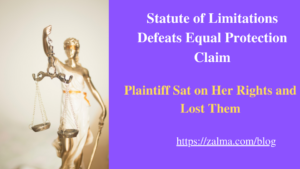Statute of Limitations Defeats Equal Protection Claim

Sharon Motley appealed the district court’s dismissal of her putative class action brought against Hal Taylor in his official capacity as Secretary of the Alabama Law Enforcement Agency (“ALEA”) for failing to warn her that her drivers license was suspended. In Sharon Motley, on behalf of herself and those similarly situated v. Hal Taylor, in his official capacity as Secretary of the Alabama Law Enforcement Agency, No. 20-11688, United States Court of Appeals, Eleventh Circuit (May 12, 2022)
FACTUAL BACKGROUND
In 2013, the Montgomery County District Court ordered Motley to pay fines and court costs after she pled guilty to a traffic ticket. Motley did not pay the ticket because she could not afford to do so. Motley’s driver’s license was suspended for failure to pay her fines. She had not received prior notice that her driver’s license would be suspended if she did not pay the ticket. Before suspending her license for failure to pay, neither the court nor ALEA-which administers all state laws relating to the operation of vehicles-held a hearing to determine whether her failure to pay was willful.
Employers rescinded job offers to Motley after learning of Motley’s suspended driver’s license because without a valid license it was impossible for her to perform certain job functions like deposit checks or travel for work.
Motley’s Lawsuit
Motley sued Taylor in his official capacity, seeking declaratory and injunctive relief on behalf of herself and a putative class of “[a]ll individuals whose driver’s licenses are suspended for nonpayment of traffic tickets.”
Motley’s complaint alleged in a single claim that Alabama R. Crim. P. 26.11(i)(3)-which authorizes license suspensions for failures to pay traffic fines-violates the Equal Protection and Due Process Clauses of the Fourteenth Amendment.
Specifically, Motley alleged that Rule 26.11(i)(3) authorizes the suspension of a driver’s license for nonpayment of traffic fines or court costs without prior notice, the opportunity to be heard, or an express finding that the individual is able to pay and willfully failed to do so.
The district court (1) denied Taylor’s motion to dismiss to the extent it was based on the statute of limitations but (2) granted Taylor’s motion to dismiss for failure to state a claim on the merits.
DISCUSSION
The parties agree that, because Motley filed her claim under 42 U.S.C. § 1983 in Alabama, the applicable statute of limitations period is two years. The statute of limitations begins to run on the date where the facts which would support a cause of action are apparent or should be apparent to a person with a reasonably prudent regard for his rights.
The district court found that
the state court suspended Motley’s driver’s license for failure to pay in December 2013; and
she knew or should have known of her suspended license before July 3, 2017.
Thus, Motley’s two-year clock began to run sometime before July 3, 2017, and her claim was time-barred unless an exception to the statute of limitation applies.
IS THERE AN EXCEPTION TO THE STATUTE
Motley argued that the indefinite suspension of her license was a continuing violation. A plaintiff may bring an otherwise time-barred claim when additional violations occur within the statutory period. Applying the continuing violation doctrine the appellate court must distinguish between the present consequence of a one time violation, which does not extend the limitations period, and the continuation of that violation into the present, which does. The continuing violation doctrine is not triggered merely because the harm caused by the defendant’s action continues after the limitations period.
Motley alleged a continuing harm, not a continuing violation. While Motley’s claim does encompass an equal protection injury, that injury stems from the alleged due process violations, all of which occurred on or before December 20, 2013, when her license was suspended.
The court concluded that all of Motley’s alleged injuries stem from the 2013 suspension of her driver’s license without an opportunity to be heard or to prove her indigency. Accordingly, her claim is time-barred.
Motley’s claim against Taylor accrued at least sometime before July 3, 2017. Thus, her complaint was untimely when she filed it on July 3, 2019. And the continuing violation doctrine does not apply to save her from the statute of limitations.
Stale claims make it impossible for a court to deal fairly with an allegation of wrongdoing because witnesses either forget or are unavailable to testify. No litigant should be required to defend against a stale claim. Motley, perhaps because the suit was frivolous, waited four years after the accrual of a cause of action to sue and, therefore, her case was dismissed and the trial court’s decision was affirmed.

(c) 2022 Barry Zalma & ClaimSchool, Inc.
Barry Zalma, Esq., CFE, now limits his practice to service as an insurance consultant specializing in insurance coverage, insurance claims handling, insurance bad faith and insurance fraud almost equally for insurers and policyholders. He practiced law in California for more than 44 years as an insurance coverage and claims handling lawyer and more than 54 years in the insurance business. He is available at http://www.zalma.com and zalma@zalma.com.
Subscribe to Zalma on Insurance at locals.com https://zalmaoninsurance.local.com/subscribe.
Subscribe to Excellence in Claims Handling at https://barryzalma.substack.com/welcome.
Write to Mr. Zalma at zalma@zalma.com; http://www.zalma.com; http://zalma.com/blog; daily articles are published at https://zalma.substack.com. Go to the podcast Zalma On Insurance at https://anchor.fm/barry-zalma; Follow Mr. Zalma on Twitter at https://twitter.com/bzalma; Go to Barry Zalma videos at Rumble.com at https://rumble.com/c/c-262921; Go to Barry Zalma on YouTube- https://www.youtube.com/channel/UCysiZklEtxZsSF9DfC0Expg; Go to the Insurance Claims Library – https://zalma.com/blog/insurance-claims-library/
Like this:
Loading…
Related


